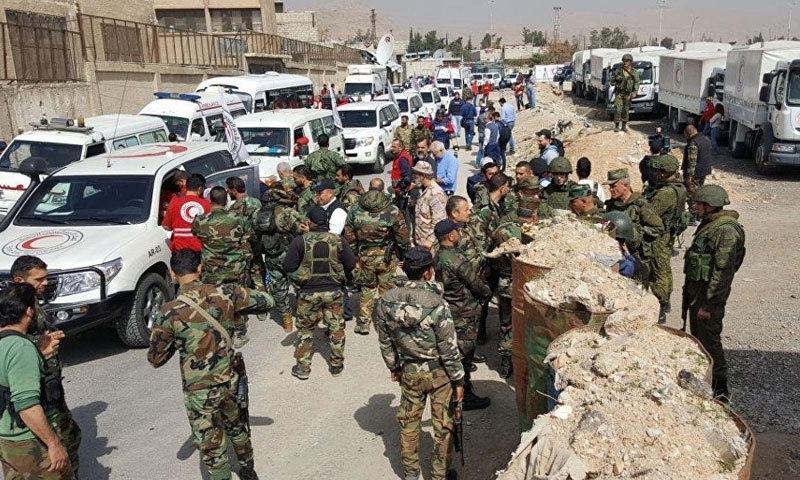



Almost two years after the announcement of the“ Settlement agreement” signed in the Eastern Ghouta under the auspices of Russia, between the Syrian opposition factions and the Syrian regime, the Syrian regime continues conducting raids on the houses of civilians and former workers in the opposition factions’ health and social services in the cities and towns of the Ghouta area of Damascus. The Syrian regime is also engaged in the compulsory recruitment of young men.
Enab Baladi’s correspondent in Eastern Ghouta has monitored, since the beginning of this year, that the Syrian regime forces have intensified their security campaigns to include tens of young men, mostly in the cities of Douma, Arabin and Ayn Tarma. Besides, the state security forces have swept homes, shops, and warehouses, and set up temporary “flying” checkpoints within the neighborhood to be able to search all passers-by.
The most recent home raid took place on 13 March, in the neighborhoods of Abd al-Raouf and al-Hajjaria in the city of Douma. This raid had been going on for two previous weeks after news of the presence of weapons hidden and buried in the neighborhood by members of the opposition factions, during their control of the region. As a result of the raid, five young men were taken to the State Security branch in Douma, without knowing their fate.
On 10 March, the Syrian regime launched a campaign of arrests against tens of young men from the town of Ayn Tarma after raiding dozens of houses in the district of al-Zainiyah in the area.
Patrols linked to the Syrian Republican Guard began a raid on houses at 7:00 a.m, which lasted for two hours, during which they searched civilian homes accurately.
Enab Baladi’s correspondent learned from local sources that the arrest campaign started following the arrival of a list of the names of those wanted for reserve military service and security issues amid the spread of temporary checkpoints in the town and conduct of the so-called “security check” for passers-by.
The deteriorating security situation affects the work of the residents and their daily activities in the town adversely. At times of arrests or raids, the area suffers from a kind of paralysis in the movement of markets and citizens. People are forced to stay at home for fear that the security forces would carry out a “security check” and arrests.
21-Year old Mazen from the town of Zamalka was forced to go into hiding at one of his friends, for fear that his name might be on the wanted lists that consistently reach the town’s mukhtars.
Mazen, who asked not to be fully named for security reasons, told Enab Baladi that hundreds of young men in Ghouta have not gone to the capital, Damascus, since the Syrian regime re-entered Ghouta. Leaving Ghouta for the capital needs security approval even if the person holds a document for deferment of military service or “settlement” paper.
Despite the relative calm that has prevailed in the Eastern Ghouta during the current period due to the fear of the spread of the “Corona emerging” virus (Covid 19), the Syrian regime forces keep on tightening their security grip and implementing constructive security measures such as raids and almost weekly arrests on the town of Ayn Tarma.
Thus, fears of arrests and Coronavirus have controlled the residents of the cities and towns of the Eastern Ghouta; people are forced to stay home, their movement is paralyzed, and streets appear empty, especially after the decisions given to close schools, cancel all congregational prayers and Friday prayer. Consequently, all these factors together led to a deterioration in economic activity and living standards.
In other words, the area is experiencing something similar to the blockade, in light of the worsening services, due to the slow development of the government-affiliated institutions.
if you think the article contain wrong information or you have additional details Send Correction